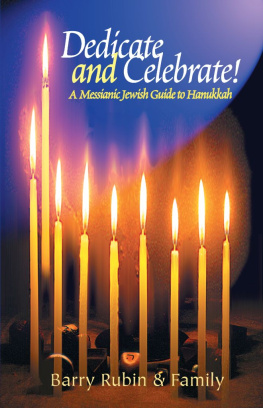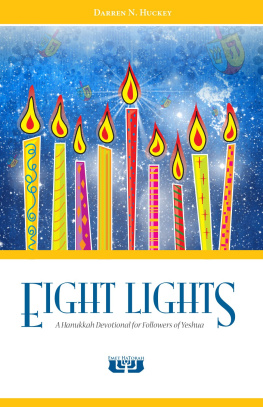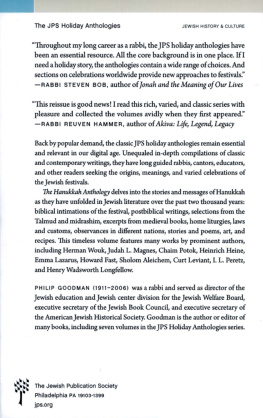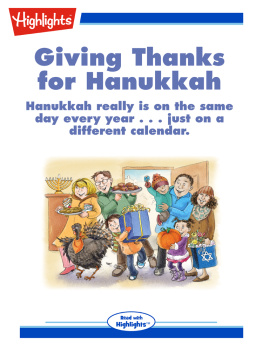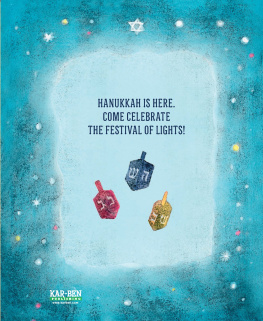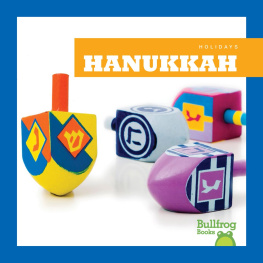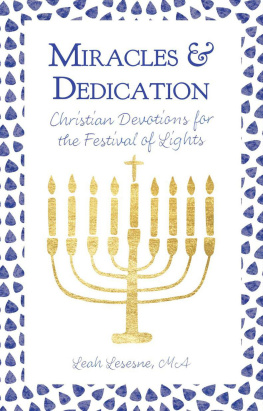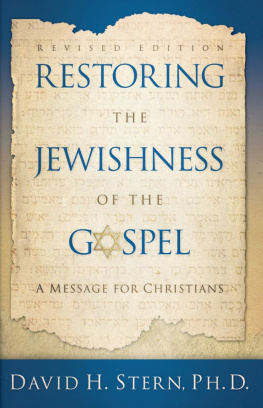Barry Rubin and Family - Dedicate and Celebrate: A Messianic Jewish Guide to Hanukkah
Here you can read online Barry Rubin and Family - Dedicate and Celebrate: A Messianic Jewish Guide to Hanukkah full text of the book (entire story) in english for free. Download pdf and epub, get meaning, cover and reviews about this ebook. year: 1999, publisher: Messianic Jewish Communications, genre: Children. Description of the work, (preface) as well as reviews are available. Best literature library LitArk.com created for fans of good reading and offers a wide selection of genres:
Romance novel
Science fiction
Adventure
Detective
Science
History
Home and family
Prose
Art
Politics
Computer
Non-fiction
Religion
Business
Children
Humor
Choose a favorite category and find really read worthwhile books. Enjoy immersion in the world of imagination, feel the emotions of the characters or learn something new for yourself, make an fascinating discovery.
- Book:Dedicate and Celebrate: A Messianic Jewish Guide to Hanukkah
- Author:
- Publisher:Messianic Jewish Communications
- Genre:
- Year:1999
- Rating:5 / 5
- Favourites:Add to favourites
- Your mark:
- 100
- 1
- 2
- 3
- 4
- 5
Dedicate and Celebrate: A Messianic Jewish Guide to Hanukkah: summary, description and annotation
We offer to read an annotation, description, summary or preface (depends on what the author of the book "Dedicate and Celebrate: A Messianic Jewish Guide to Hanukkah" wrote himself). If you haven't found the necessary information about the book — write in the comments, we will try to find it.
All about Hanukkah for Jews and Christians
Dedicate and Celebrate: A Messianic Jewish Guide to Hanukkah — read online for free the complete book (whole text) full work
Below is the text of the book, divided by pages. System saving the place of the last page read, allows you to conveniently read the book "Dedicate and Celebrate: A Messianic Jewish Guide to Hanukkah" online for free, without having to search again every time where you left off. Put a bookmark, and you can go to the page where you finished reading at any time.
Font size:
Interval:
Bookmark:
and Celebrate!
Copyright 1999 by Barry Rubin and Family
Unless otherwise noted, all Scripture quotations are taken from the Complete Jewish Bible, copyright 1998 by David H. Stern, and published by Jewish New Testament Publications, Inc. Used by permission.
The Living Hanukkah Menorah, Nun, Gimel, Hay and Shin, Hanukkah Madlibs, and Hanukkah cards copyright 1999 by Steffi Rubin and may be used without permission.
All other material may not be reproduced, stored in a retrieval system, or transmitted in any form or by any means without prior permission of the publisher, except for brief reviews in magazines, or as quotations in another work when full attribution is given. All rights reserved.
ISBN 978-1-936716-01-2
Library of Congress Control Number: 202278565
Lederer Books
a division of
Messianic Jewish Publishers
6120 Day Long Lane
Clarksville, MD 21029
Distributed by
Messianic Jewish Resources
www.messianicjewish.net
_______________
Barry (Baruch) Rubin

T he only place in the Bible that Hanukkah is mentioned by name is John 10:22. Messiah was in the Temple for the feast of dedication, as many translations render the Greek word eng-kai-nia. This Greek word translates the Hebrew hanukkah. Both words convey the idea of consecration or dedication. Because Messiah connected with Hanukkah, we believe that Christians, as well as Jews, can enjoy this celebration, all the more if its eternal importance is understood.
The focus of the holiday is the re-dedication of the Temple of the Lord about 160 years before Messiahs birth. God rescued his people, and preserved biblical Judaism. Without this, the prophetic fulfillment pertaining to the birth of Messiah could not have happened. Without Jews, Messiah could not have been born through the tribe of Judah, as a descendant of King David.
Ive invited my family to participate with me in sharing this, one of our favorite holidays, with you. My wife, Steffi, a well-known graphic artist, has offered some wonderful illustrations to help convey Hanukkah to you; she has also written childrens materials that appear later in this book. Shes also a wonderful cook and has included several recipes unique to Hanukkah. Caution: dont eat too much of this; these are not fat-free recipes.
Our older daughter, Rebecca, an accomplished pianist, has pulled together some of the traditional Hanukkah songs that help tell the story. Youll enjoy singing them. Our younger daughter, Shira, an accomplished singer and party-person, has written out the instructions for the dreydel game, a game developed to teach the story of Gods miraculous redemption of the Jewish people.
I hope you will enjoy learning about this very special holiday, one which both Christians and Jews can celebrate.
Background
Solomons Templethe first Templewas majestic and magnificent, but it was destroyed when the people of Israel were taken captive by the Babylonians in 586 B.C.E.
The books of Ezra, Haggai, Zechariah, and Nehemiah recount the building of the Second Temple, after the Jewish people returned from exile in Babylon. This Temple, built under Ezras leadership, was dedicated approximately 450 years before Messiah. Within a few centuries, this Temple was profaned and desecrated by Gods enemies. The dedication after the desecration gave rise to the holiday we now call Hanukkah, which means dedication.
First and Second Maccabees (apocryphal books), Josephus in his Antiquites, and The Talmud (tractate Shabbat 21b), tell the story of this holiday. Also, Daniel 8 records the prophets vision of the future, a vision that precisely foretells the events of Hanukkah.
What is the history of Hanukkah?
History records that Alexander the Great conquered most of the known world several centuries before Messiahs birth. After Alexander died, his kingdom was divided between his four generals. The Syrian-Greeks (the Seleucids) and the Egyptian-Greeks (the Ptolomies), two of the four kingdoms, often battled each other over Israel. Ultimately, the Syrian-Greeks won. When their ruler died, a man named Antiochus took over his kingdom, which contained what Daniel calls the Beautiful LandIsrael.
In order to subjugate the Jews, Antiochus, who called himself Epiphanes, meaning God manifest, began to outlaw Jewish customs and observances such as Sabbath, circumcision, and kosher laws. He reasoned that if he could get the Jews to give up their strange ways, he could homogenize his country and better control it. He didnt want any religious practices except the Greek (Hellenistic) ways.
He continued to Hellenize the Hebrews. He destroyed Torah scrolls, placed heathen altars everywhere, made Jews bow down before Greek gods, placed a statue of Jupiter in the Temple, and finally sacrificed a pig in the Holy of Holies. That was the last straw.
First Maccabees states, Now the fifteenth day of the month [KislevNovember/December], in the hundred forty and fifth year, they [the Syrian-Greeks] set up the abomination of desolation upon the altar, and builded idol altars throughout the cities of Juda on every side (1:54). This was the pagan Saturnalia ceremony, in which a pig was sacrificed in the Holy of Holies, the place of Gods Presence.
In the small town of Modin, a man went to sacrifice to the heathen gods according to the law of the land. Mattathias, a righteous priest of Israel, a descendent of Moses brother Aaron, an observant man of God, could not take it any longer. Just as Pinchas (Phineas) had done a millennium before him, when unholiness was being foisted upon Israel (Num. 25:69), Mattathias rose up and killed the Jew who was sacrificing to the gods of Greece.
He knew that this would begin the revolt, and shouted, Let all who are zealous for the Law [and the Lord] follow me! Mattathias and his sons, led by Judah, mustered enough forces to eventually overthrow the Syrian-Greeks. All the sons of Mattathias joined together, as well as many other zealous Jews willing to wage guerrilla warfare until the Syrian-Greeks were overthrown. Judah and his brothers were called Maccabees. In Hebrew, Maccabee means hammer, an apt description of their guerilla tactics. Thus began the Maccabean revolt.
After a three-year struggle, ending in 165 B.C.E., the Temple was recaptured, restored, and rededicated. Hanukkah commemorates and celebrates the re-dedication of the Holy Temple, so despicably desecrated by Antiochus and his Syrian-Greek legions.
You can imagine, then, that this day has been observed with great joy by Jewish people. Not only does it recall the rescue of the Jews, it remembers the day when God was victorious over heathen Hellenism.
The dedication sacrifice, after the Temple was recaptured, repaired and rededicated, occurred on the same day as the desecration:
Now upon the same day that the strangers profaned the temple, on the very same day it was cleansed again, even the five and twentieth day of the month which is Kislev. And they kept eight days with gladness, as in the Feast of Tabernacles (2 Maccabees 10:56).
Interestingly, 25 Kislev was also the day the foundation of ADONAIs temple was laid (Hag. 2:18).
Tradition teaches that when the Temple was restored, only one vial of oil had the seal of the High Priest on it, indicating that it could be used in the Temple menorah, the candelabra. But the one days worth of sacred oil miraculously lasted for eight days, long enough for more oil to be prepared, so that the Temple could be ritually purified.
Yeshua the Messiah caused two loaves of bread and a few fish to feed thousands. Miracles occur. If God, then, was trying to communicate his pleasure regarding the restoration of his house, he very well might have caused this miracle to happen.
Font size:
Interval:
Bookmark:
Similar books «Dedicate and Celebrate: A Messianic Jewish Guide to Hanukkah»
Look at similar books to Dedicate and Celebrate: A Messianic Jewish Guide to Hanukkah. We have selected literature similar in name and meaning in the hope of providing readers with more options to find new, interesting, not yet read works.
Discussion, reviews of the book Dedicate and Celebrate: A Messianic Jewish Guide to Hanukkah and just readers' own opinions. Leave your comments, write what you think about the work, its meaning or the main characters. Specify what exactly you liked and what you didn't like, and why you think so.

